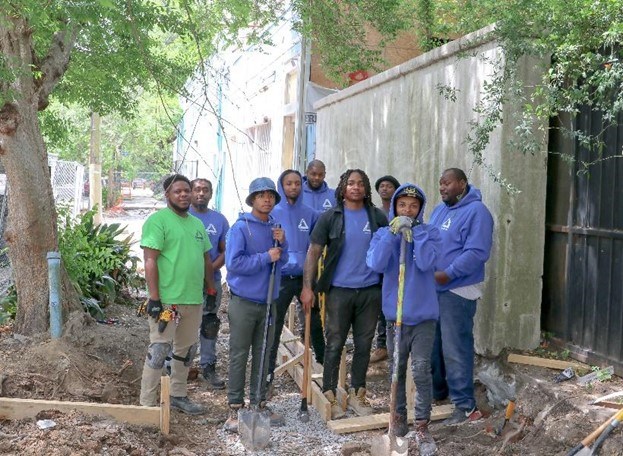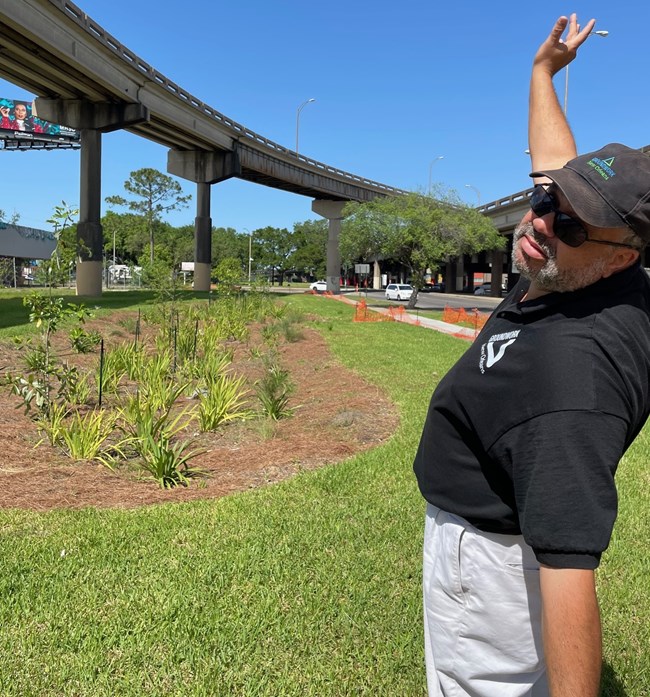Last updated: March 21, 2024
Article
Workforce Development: Investing in youth. Increasing resilience

GROUNDWORK NEW ORLEANS
Groundwork New Orleans helps empower local youth and young adults with paid job training in green infrastructure to mitigate storm water threats. Originally focused in areas between downtown and Central City, Groundwork New Orleans projects now extend city-wide, with major investments in the Seventh Ward, Central City, Gentilly, and Bywater areas.
New Orleans is known for round-the-clock nightlife; for its vibrant music and food scene; and increasingly, for its weather. Susceptible to intense storms, including hurricanes and tornadoes, New Orleans is one of the wettest cities in the country. Severe weather events are happening with alarming frequency, their impacts exacerbated by rising sea levels, low elevation, and poor storm water infrastructure. In addition, a significant percentage of residents live in “urban heat islands” — places where the local temperatures are at least eight degrees higher than greener areas of the city. Groundwork New Orleans, along with a coalition of grassroots organizations, has stepped up to help address these challenges by building green infrastructure and expanding green spaces.
Groundwork New Orleans’ green infrastructure projects are led by the Groundwork Climate Resilience Environmental Workforce (or Ground CREW). This fee-for-service apprenticeship program employs young adults ages 18-25 to learn about and install green infrastructure—rain gardens, bioswales, improved drainage, and innovative solar structures. The team is quick to point out that this is not a “one and done, check the box” certification program. Students benefit from hands-on training and contribute to building tangible community assets during their time with Ground CREW. Training days are molded around students’ needs and schedules, and participants are paid a fair wage ($15-$25 an hour, depending on experience).
Another paid job training program, the Green Team, offers high school-aged youth opportunities to learn a wide variety of skills, including green infrastructure maintenance, community engagement, native planting, climate action, and more. The Green Team’s home base is the Earth Lab – an outdoor environmental education classroom in the 7th Ward. This multi-use space houses pollinator gardens, composting beds, raised garden beds, and Green Infrastructure demonstrations, including a 30-foot bioswale. The adjacent Healing Center even hosts monthly art markets here.
Todd Reynolds, Executive Director of Groundwork New Orleans, spent much of his career working with at-risk and out of school youth in New Orleans. To explain his approach working with youth, he quotes Dr. Hubert Green, a child psychologist, who said “Children will do well if they can, not if they want to.”
Ground CREW and Green Team have had significant impact on the health and resilience of their community. One of their larger projects was the construction of Legacy Park, which features turf, permeable pavers, grown trees, a rain garden, and a large mural project. The green space’s capacity for storm water retention is much larger now, and the space doubles as a play area for the neighboring school. Another major accomplishment is the patented ECO Bench, a project that opened myriad of opportunities to build technological assets for communities of need and increase emergency response options—all while using power from the sun. Groundwork New Orleans worked with Tulane University to create this unique structure that provides free solar-powered electricity, real time weather updates, and a shady spot to sit. The success of these benches led to the pursuit of another innovative idea, mobile solar stations (a group of moveable solar panels, built by Ground CREW members). When there are power outages due to storms, these can be deployed in hard hit communities. For instance, when the EF3 tornado (the strongest on record to hit New Orleans) landed, Groundwork New Orleans and partners deployed Solar Powered Community Resilience Trailers within 24 hours. They were able to power five community resiliency sites — keeping food pantry refrigerators running, providing charging stations, offering access to Wi-Fi, and more.
The Groundwork youth teams are also helping their neighbors — individual home and business owners — make sustainable choices in the face of rising heat and extreme weather events. To increase community interest in green infrastructure projects, Groundwork will often do the work for a fraction of what a landscape architect would charge —sometimes they will do it for free!
“Our youth development approach centers around building family and creating a safe space for youth to be themselves and decompress from their screens.” Riley Essert, Youth Program Manager, Groundwork NOLA.

Q & A with Todd Reynolds, Executive Director, Groundwork New Orleans
What are your guiding principles for youth development?
The only way to be effective is to make a real, holistic investment. I don’t believe in short-term programs where young people enroll in an 8 to 12-week program and get a certificate. It takes time to help young folks figure out what they are good at, what skills they need to build. They need support to work through a lot of what we take for granted. So many of us had someone in our corner, guiding us, but many young folks are essentially raising themselves these days. They don’t have the tools in their toolbox to address the many situations they come across in life. We think our model works because we make a long-term investment and pay our youth a living wage. If you stay with us for 2 to 3 years, working on real world projects, you gain experience and build your resume. After that period, you can continue to work with us, or decide to move on. By then, you have experience and the certifications required (for solar, green infrastructure, etc.) to get a solid job with good pay.
How many young people participate in your programs? What size staff do you have?
We run two programs: Groundwork Climate Resilience Environmental Workforce (or Ground CREW) and the Green Team. The Ground CREW employs young adults ages 18-25; Green Team is designed for high school-aged youth. Because our model requires such deep investment in each participant, we accept a limited number of youth into each cohort, typically 15 - 20 per year per program. Our core staff is five people – Executive Director, Youth and Environmental Programs Director, and two Green Infrastructure and Solar Installation site instructors (both former program participants).
How do you reach and engage New Orleans youth in your programs?
As a former dean and principal, I am connected to every local high school. The Groundwork team has a strong reputation in the community — we know enough teachers, parents, and families to bring in applicants. Our challenge is increasing our funding so we can serve more youth. We are continually writing grants to expand our programming, especially the Green Team. Right now, we have a single cohort that pulls from all the city high schools. I would love to have Green Teams established throughout the school system, to be able to run a cohort of 15 – 20 at each high school.
Which partners are engaged in your youth work?
We operate within a strong grassroots partnership of community-based organizations focused on green infrastructure, solar, water, and waste-water management. Those organizations are our direct pipelines to youth employment. By building a model around community partnerships, we’ve been able to keep our overhead low and maintain our focus on the three P’s: people, projects, and programs. For instance, we collaborate with a local organization called Healthy Community Services (HCS) in the 7th Ward. Led by Dr Angela Chalk, HCS has been doing environmental work for years from a health equity lens. Groundwork takes on green infrastructure and solar projects with and for their team. We also work with Water Wise Gulf South Collective, a group of community-based organizations strengthening public awareness and the use of green infrastructure. These partnerships connect us with a wide range of community leaders who provide context and connections for our work. When I became Executive Director five years ago, I realized quickly that there are two kinds of nonprofit organizations — those who have sufficient resources, and those who don’t. I decided early on that we would collaborate with the latter, proposing that we all band together to pursue funding. We each take the lead on different grants, including other organizations as sub-awardees based on project need and organizational capacity. That strategy has allowed each of the participating organizations to grow from a funding and capacity perspective. It’s also allowed us to secure larger, multi-year grants we would never be able to attract on our own.
What advice would you give to others who are starting a Green Team or Ground Corps program?
You need to be committed to the investment aspect of this work. It’s not easy – funding is not designed for that sort of intensive investment. There’s much more interest in quantity, what I refer to as the “widget factory” approach to workforce development. But to succeed, you need to keep these young people engaged as long as you can. The results speak for themselves — our participants are trained, they are being paid to do work that is meaningful to them and to their community.
How do you measure impact for your youth programming?
When it comes to impact, we are in an interesting place. It’s challenging to measure ourselves against typical workforce development metrics — we are not churning out hundreds of students every year. We have found a real sweet spot as a workforce development program being measured on the outcomes of our environmental initiatives. Most of the grants I write are for our green infrastructure, solar, and water management projects —I request additional funds in those grants to implement the work through youth development. Right now, our effectiveness is measured on environmental impact. And everywhere we go, we leave a powerful resilience asset – solar hubs, bioswales, rain gardens, etc. That asset will be maintained by local partners and significantly benefit the community over the long term.
GROUNDWORK NOLA
Established: 2006
Learn more about how Groundwork New Orleans invests in youth to build resilience.
